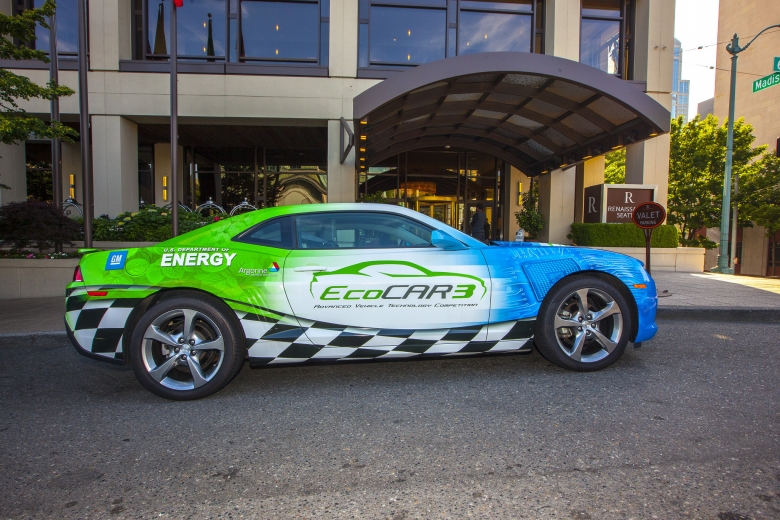Imagine a high-powered sports car with loads of performance and speed that’s also one of the most fuel-efficient vehicles on the road. The 16 North American university teams participating in the EcoCAR 3 Advanced Vehicle Technology Competition are in the process of making this dream a reality.
Sponsored by the Energy Department and General Motors, EcoCAR 3 is a four-year competition for teams to redesign the 2016 Chevrolet Camaro to reduce its environmental impact while maintaining its “muscle car” power and consumer standards — including performance, utility and safety.
This week, the teams are presenting and celebrating their first year of work at the EcoCAR 3 Year 1 finals in Seattle. After presenting their engineering designs, computer models and business plans, each team will receive a set of keys to a brand new 2016 Chevrolet Camaro from General Motors to re-engineer into a more eco-friendly car.
Year 1 has set the stage for the competition’s next three years of work, which will help pave the way for participating students to become the next generation of auto engineers. The teams are following a technology development process very similar to what General Motors and other vehicle manufacturers use when designing a new vehicle — such as using the Energy Department-supported Autonomie software to develop and simulate potential designs.
Primary engineering tasks include everything from developing electric drive vehicle battery systems, to creating dashboard designs for “infotainment” and building control systems that manage the flow of power through the vehicle. In addition, team members specializing in communications and business create public outreach strategies, attract media coverage and produce marketing campaigns.
To show off their progress, teams hosted a “trade show” at the Year 1 finals complete with elaborate posters and even full digital simulations, just as if they were presenting at an industry conference.
These experiences will help prepare students like Tom Gorgia, engineering manager for the Embry-Riddle EcoEagles, for their future professions. Gorgia, now on his fifth year of participating in Advanced Vehicle Technology Competitions, summed up his experience that started with EcoCAR 2 this way: “EcoCAR has taught me how to be a better professional and a better leader. It’s allowed me to design an actual vehicle in a real-world situation.”
Going beyond a traditional engineering program, EcoCAR 3 offers a hands-on preview into a dynamic, constantly evolving industry. Bryan Mason, the communications manager for the McMaster University team said, “What drew me to EcoCAR 3 was a real interest in learning about the future of the automotive industry and exactly what sort of future it will be. Powering the professionals of tomorrow is really what EcoCAR 3 is all about.”
Year 1 of EcoCAR 3 has set the foundation for a long, rewarding journey for these teams. From learning how to work across areas of expertise to solving last-minute mechanical difficulties, participating students will gain unique perspectives that will serve them well in their future roles as leaders in the clean energy economy.

